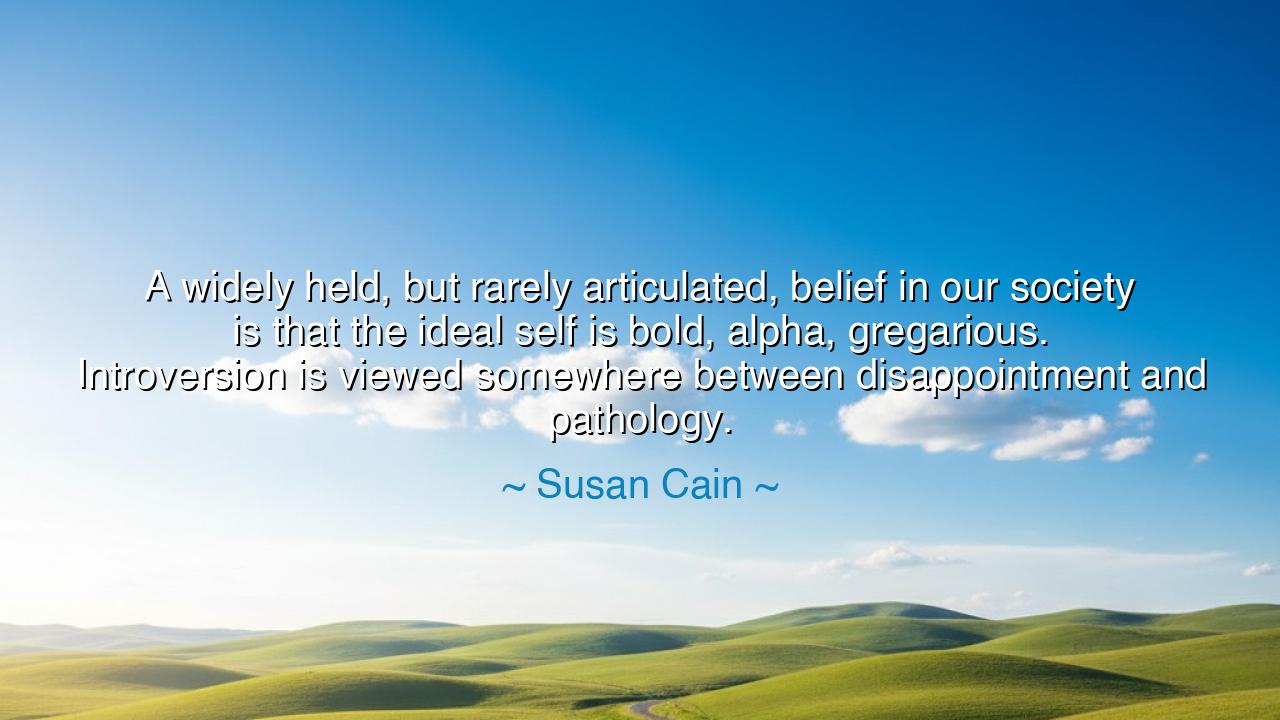
A widely held, but rarely articulated, belief in our society is
A widely held, but rarely articulated, belief in our society is that the ideal self is bold, alpha, gregarious. Introversion is viewed somewhere between disappointment and pathology.






The words of Susan Cain—“A widely held, but rarely articulated, belief in our society is that the ideal self is bold, alpha, gregarious. Introversion is viewed somewhere between disappointment and pathology.”—unveil a truth that lingers like an unseen weight upon many souls. In her voice we hear not condemnation, but lament and revelation: that society, in its worship of the loud and the dazzling, has forgotten the quiet strength of those who dwell in contemplation, solitude, and depth. The ideal self, as culture proclaims it, is the conqueror, the orator, the extrovert whose laughter fills the hall. Yet Cain reminds us that this is not the only self worth honoring, nor the only path to greatness.
The ancients themselves knew the danger of worshipping only one archetype of human excellence. In Athens, Pericles thundered with words that stirred nations, yet Socrates, who asked quiet questions in the marketplace, became the gadfly that changed philosophy forever. In Rome, generals were hailed as bold alphas, but Marcus Aurelius, the philosopher-emperor, spoke in solitude to his own soul, and his meditations now outlive his legions. Cain’s truth is ancient: society errs when it dismisses the contemplative, the introverted, and the inward-looking, for their wisdom is often the wellspring of renewal.
History offers us luminous examples of this forgotten power. Consider Rosa Parks, a woman not known for speeches or fiery boldness. Her act of quiet defiance—refusing to yield her seat—ignited a movement that reshaped the moral landscape of America. She was not gregarious; she was not loud; she was steady, introverted, and strong. Yet her silence became thunder, and her stillness became a beacon. This is the irony Cain points to: that introversion, often viewed as weakness, can be the foundation of the greatest acts of courage.
Cain’s words also reveal the hidden wound carried by many. Children who are thoughtful rather than talkative, who prefer books to crowds, are too often labeled as lacking, as if their inwardness were a flaw to be corrected. Adults, too, are pressed into masks of sociability, taught to equate success with endless networking, chatter, and performance. In this lies a deep injustice: for when society prizes only the gregarious and the alpha, it silences half its wisdom, neglecting the voices of those whose gifts are born of reflection and quiet resilience.
This teaching carries with it both warning and hope. The warning: that a society which mocks introversion deprives itself of balance, creating a culture of noise without depth, action without thought, boldness without conscience. But the hope is this: that by honoring both the bold and the quiet, the gregarious and the reflective, a society may find wholeness. Just as day and night, storm and stillness, balance the rhythms of the earth, so too must boldness and introversion balance the rhythms of humanity.
The lesson for us is clear: cherish the power of quiet. Do not mistake stillness for weakness, nor solitude for emptiness. Recognize that the thinkers, the readers, the quiet listeners, contribute as much to society’s flourishing as the loudest voices. Seek balance in yourself as well: cultivate the bold when action demands it, but honor the quiet when wisdom calls. For the strongest souls are those who know when to speak and when to listen, when to move and when to remain still.
Practically, this means creating spaces in our schools, workplaces, and families that honor both temperaments. Encourage the shy child to see their gifts not as deficiencies but as strengths. Allow time for reflection in the midst of action. Value listening as much as speaking. And in leadership, remember that sometimes the best guide is not the one who shouts the loudest, but the one who thinks the deepest.
Thus, Susan Cain’s words endure as a correction to a world intoxicated with boldness. “Introversion is viewed somewhere between disappointment and pathology.” Let us banish that lie and restore balance to our vision of the ideal self. For the world needs its bold leaders, yes—but it also needs its quiet visionaries, its patient builders, its gentle truth-tellers. Only when we honor both can society be whole, and only then can humanity walk in the fullness of its strength.






AAdministratorAdministrator
Welcome, honored guests. Please leave a comment, we will respond soon